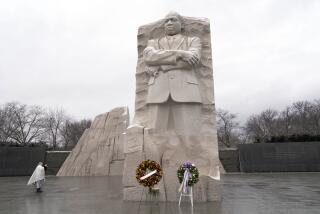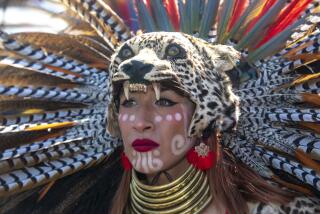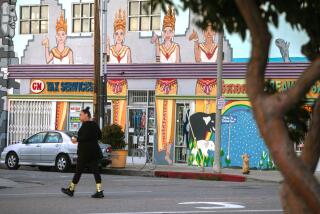Naima Olugbala says much has changed since...
- Share via
Naima Olugbala says much has changed since 1966, when African-Americans first celebrated Kwanzaa, a cultural observance to promote black pride.
That year, Olugbala and her husband had just moved to Pasadena and were inspired by activist Maulana (Ron) Karenga, who created Kwanzaa by combining elements from African harvest festivals.
“It was the ‘60s and a lot was going on,” said Olugbala, 45, now the director of Omowale Ujamaa Northwest Community School, a private elementary school in Pasadena that emphasizes Afrocentric teachings. “(Kwanzaa) was thought to be pretty revolutionary. A lot of people had stopped celebrating Christmas.”
Nowadays, Olugbala said, Kwanzaa is edging toward the mainstream. She can drive down Lake Avenue and see “Happy Kwanzaa” spray-painted alongside the more typical holiday greetings on the windows of a McDonald’s.
And no longer do observers have to carve their own kinaras, or candelabra, which are lighted to mark the seven days of Kwanzaa; local stores stock ready-made ones.
Starting this week, several local Kwanzaa observances will take place. An African storytelling hour will be held today at 11 a.m. at La Pintoresca Library, 1355 N. Raymond Ave.
Then at 7 tonight at Jackie Robinson Center, 1020 N. Fair Oaks Ave. in Pasadena, the first of seven candles will be lighted to mark umoja, or unity--the first principle of Kwanzaa. Newcomers will be introduced to the history of Kwanzaa, and participants may bring fruit. Admission is free. For more information, call the center at (818) 791-7983.
On Friday at 7 p.m., the Omowale Ujamaa school, 1415 N. Raymond Ave., will hold a discussion of kujichagulia, or self-determination, the second principle of Kwanzaa. Admission is $5 per person. To reserve seats, call (213) 684-2266 or (818) 798-5406.
Kwanzaa festivities will culminate Tuesday with a 7 p.m. potluck feast at Jackie Robinson Center, which will include drummers, storytelling and an African naming ceremony. Admission is free, and participants are asked to bring a food dish, preferably not pork.
More to Read
Sign up for The Wild
We’ll help you find the best places to hike, bike and run, as well as the perfect silent spots for meditation and yoga.
You may occasionally receive promotional content from the Los Angeles Times.






